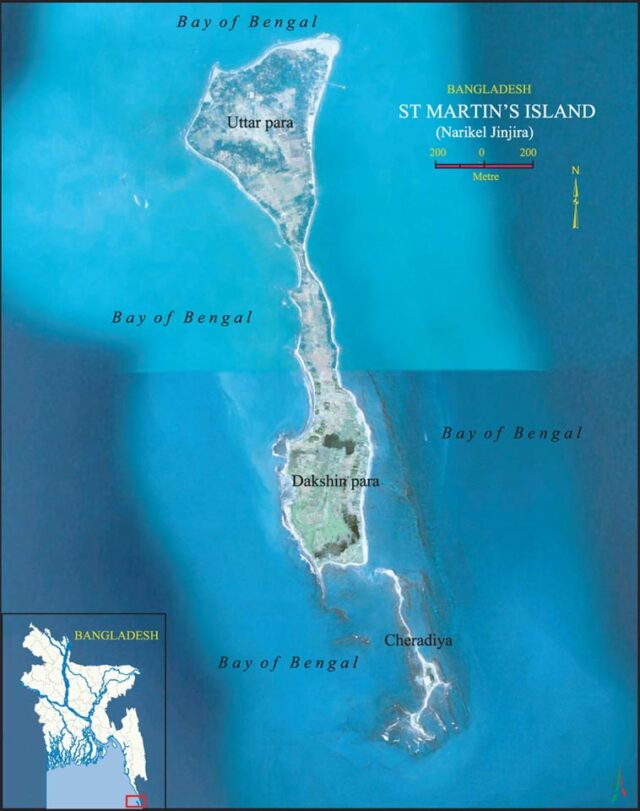The deposed autocrat of Bangladesh, Sheikh Hasina, has claimed that she was overthrown by the United States due to her refusal to allow the country to establish a military base on St. Martin’s Island. In a statement sent to the Indian online news blog ‘The Print,’ Hasina reiterated this accusation, suggesting that her downfall was orchestrated by external forces.
This is not the first time Hasina has made such claims. She has previously alleged that pressure from global powers, including the United Nations, the United States, and the European Union, was part of a broader effort to destabilize her government. These international bodies had urged her to hold free and fair elections to restore faith in democracy in Bangladesh—a call that Hasina resisted, leading to widespread criticism of her administration’s increasingly authoritarian rule.
Hasina’s recent statements appear to be an attempt to deflect attention from her government’s controversial practices, including alleged election rigging and the suppression of political opposition. By casting herself as a victim of foreign interference, Hasina is likely trying to rally nationalist support and deflect blame for her ousting onto external actors, rather than addressing the domestic challenges that led to her political downfall.
These claims, however, have been met with skepticism, particularly given the lack of credible evidence supporting the idea that the U.S. sought to establish a base on the small and strategically insignificant island. Critics argue that Hasina’s narrative is more about political survival than truth, designed to shift focus away from her regime’s failures and the growing demand for democratic reforms in Bangladesh.
Sheikh Hasina’s recent allegations regarding St. Martin’s Island and her claim that the United States sought to acquire it in exchange for her remaining in power are not only misleading but seem to be an attempt to distract from her own political failings. These statements, made after her ouster, are indicative of a leader desperate to shift blame and vilify foreign powers rather than accepting responsibility for her government’s downfall.
First and foremost, the accusation that the U.S. wanted to establish a military base on St. Martin’s Island lacks credible evidence. This notion has been consistently refuted by U.S. officials. As far back as 2003, the then-U.S. Ambassador to Bangladesh, Mary Ann Peters, made it clear that the United States had “no plans, no requirement, and no desire for a military base” on the island or elsewhere in Bangladesh. These statements have been reiterated multiple times, including by the U.S. Department of State, which has firmly denied any negotiations or intentions involving the island.
Hasina’s claims also conveniently ignore the geopolitical realities of the region. The United States has well-established military bases in strategic locations across the Indo-Pacific, making the need for a base on such a small and vulnerable island highly questionable. The island’s proximity to Myanmar and its disputed status further complicate the feasibility of such a project.
Moreover, Hasina’s narrative appears to be a calculated move to invoke nationalist sentiments and paint her political opponents as traitors willing to sell out the country. By alleging that the opposition Bangladesh Nationalist Party (BNP) is in collusion with foreign powers to lease out St. Martin’s Island, she attempts to deflect attention from her own government’s controversial actions and autocratic tendencies, which have been widely criticized both domestically and internationally.
It’s also important to recognize that the timing of these statements is highly suspect. Coming on the heels of her forced resignation, Hasina’s assertions seem more like a last-ditch effort to rally her base and maintain influence rather than a genuine concern about national sovereignty. This tactic of blaming external forces, particularly Western powers, is a familiar one used by embattled leaders who seek to divert attention from their own shortcomings and failures.
In reality, Hasina’s tenure has been marred by increasing authoritarianism, suppression of dissent, and questionable electoral practices. The focus should remain on these critical issues rather than being sidetracked by unsubstantiated claims about foreign conspiracies. The international community and the people of Bangladesh deserve transparency and accountability, not baseless accusations designed to cloud the truth.
Sheikh Hasina’s recent claims, made while she is reportedly being sheltered in India, add a controversial dimension to the already complex political landscape in Bangladesh. By allowing Hasina to use its territory to disseminate accusations that many view as baseless, India risks being seen as complicit in a potential attempt to destabilize Bangladesh. This could lead to serious repercussions for Bangladesh-India relations, as the people of Bangladesh may begin to view India with suspicion, blaming it for enabling an ousted autocrat to undermine the current government.
Hasina’s allegations that she was overthrown by the United States due to her refusal to allow a military base on St. Martin’s Island are not only controversial but also lack credible evidence. These claims, made from Indian soil, could be interpreted as an effort to tarnish the image of Bangladesh’s current government and stir unrest within the country. If India is perceived as facilitating these actions, it could strain the historically close ties between the two nations.
Such a scenario would be detrimental to both countries. Bangladesh and India share deep economic, cultural, and strategic ties, and any deterioration in their relationship could have far-reaching consequences. For Bangladesh, it could lead to increased political instability, while for India, it could undermine its influence and trust in the region.
India’s role as a regional power comes with the responsibility of maintaining stability and fostering positive relations with its neighbors. Allowing a former leader to use its territory to spread potentially destabilizing rhetoric could backfire, leading to mistrust and resentment among the Bangladeshi populace. For the sake of regional harmony and mutual interests, India must carefully consider the implications of hosting Hasina and the potential fallout from her controversial statements.










